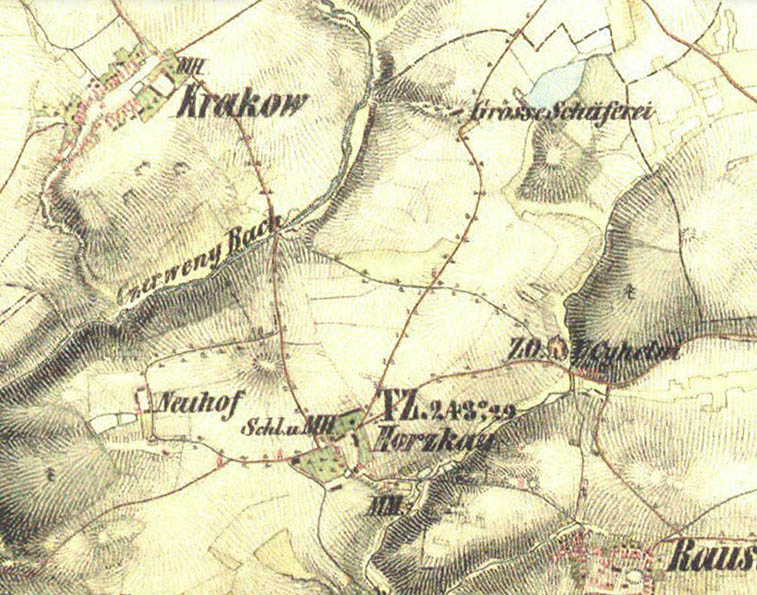Zhoř
Zhoř, Horkow, Hořkau, Schorsch, Hofkau, Hořkow, Horschkau, Horschka, Hořka, Hořkov, Schoř. The written form of “Zhoř” kept changing over the years, as people were learning to live with this peculiar word. The first mention of Zhoř dates back to 1383 when two Meierhofs (estates) were already located in the area. The estate reached its presumed heyday at the turn of the 20th century numbering around 150 inhabitants and 18 buildings. The heart of the estate included a castle compound with gardens, a distillery, a brewery, a brick factory, stables, sheds and craftsman's workshops.
After belonging to Princes of Croÿ-Dülmen, Zhoř changed several owners over the course of the 20th century before it was acquired by VáclavPilc, a prominent Czech architect. The estate was nationalized during the communist regime, the distillery shut down and the property served mostly for agricultural purposes. With its condition deteriorating, the estate fell into disrepair. Property restitution proceedings returned the compound, including forests and fields, into the hands of VáclavPilc’s descendants. Subsequently managed by a third party, many of the buildings in critical condition turned into ruins. Pig and cattle farming stopped.
The current owner, Václav Pilc’s great-granddaughter Anna Matvija, aims for a respectful revival of Zhoř and its surrounding landscape.
Zhoř in bygone times
For centuries, Zhoř was part of the Krakovec estate. Over its long history, it gradually evolved from a Meierhof (first mention from 1383) into a nobleman’s manor (first time probably in 1614) Serving as a residence to Adam Vchyňský of Vchynice or František Emanuel Hildprandt of Ottenhausen, for instance. The manor was subsequently transformed into an industrial and agricultural center (in 1745 Karel Josef Hildprandt moved to the Slabce castle) Water for the local brewery, distillery and wine-based distillery was brought via underground pipes from Polský (Polish) Pond located 1.5km away. In the second half of the 19th century, the annual beer production of the local brewery owned by Hugo of Nostice and Reineck reached 800 hectolitres, for instance. Today, Zhoř still houses an underground cellar network of unknown extent waiting to be properly mapped.
Respectful development and responsibility
“Zhoř and its surroundings, meadows, fields, forests and ponds, is a microcosm of the world and the changes it is experiencing. Our task is to prepare the landscape for long periods of drought and heavy rains. We must renew the soil horizon and transform water management. Forest regeneration, switching from clear-cutting to plus stand and changing species composition, is another task we have to tackle. We want to enhance both locals and non-locals’ relationship with this land and focus on their cultural consciousness and memory. Because Zhoř is a living testimony of the fact that the impact of work in the landscape spans over several lifetimes.”
Anna Matvija
The current owner of Zhoř
We’ll be happy if you join us in reviving Zhoř.
Sources: SEDLÁČEK, August. Hrady, zámky a tvrzekrálovstvíČeského. Prague: KnihtiskárnyFrantiškaŠimáčka, 1891 State Regional Archives in Rakovník: plans, records and documentation State Regional Archives in Prague: contracts and correspondence
zhoř in the news
Interview with Anna Matvija on page 322 as part of Set of interviews project survey Cartography (Eco) systems / RurArtMap and Map Perpedian 2021―2022
https://blackedition.cz/download/kartografie-eko(systemu)--rurartmap-a-mapa-perpedian-black-edition.pdf
2020, 25. 7. Zhoř opět ožívá. Mohlo by zde vzniknout kulturní centrum regionu
2020, 25. 7. Anna a Marek Matvijovi: Náš záměr ve Zhoři je dát jí zase budoucnost

Do you have memories, photographs or other documents about old Zhoř? Let us know.

